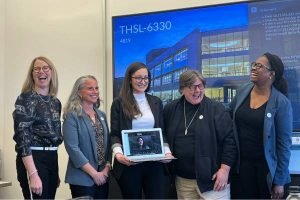What drew you to the field of public health?
[Paige] I took a course as an undergrad at the University of Michigan that was focused on the public health response to HIV/AIDS in South Africa. It was really interesting learning about South Africa’s robust public health history, which inspired me to study abroad in Johannesburg. My husband and I decided to continue living in Johannesburg for about five years after my program. I met some incredible people, including women resistance fighters in South Africa active during the apartheid era. I seriously considered focusing my doctoral studies on the experiences of these women freedom fighters, but I ultimately decided to study health policy and health services as a doctoral student.
What is your focus in public health now?

[Paige] I am focused on the technological aspects of healthcare, specifically how advancing technology can impact health equity. We need to conduct more research and develop policies to center patients and mitigate the effects of digital racism in an evolving technological environment. That involves developing regulation and policy guardrails so that these advanced analytics, like machine learning and predictive models, do not replicate or repeat inequities that shape our healthcare system.
What is digital racism? How do we address it?
[Paige] Whenever we design or implement new technology, there is a lot of hype and excitement, but there is also this misconception that technology will be more neutral or objective than human beings. Research in this field, largely led by Black women, has found that technology can reflect back to us the racism and inequities that shape the data used to build it, but it can also perpetuate these inequities in new ways.
Why is U of M SPH the right place to do this work?

[Paige] I chose to work at U of M SPH for many reasons, but especially because it stood out in its institutional willingness to name white supremacy and racism. Public health professionals and researchers have a responsibility to consider antiracism and health equity in all of our work, and many SPH community members provide real leadership in that area. It is especially necessary in our conversations about accessibility, technology, and how we are actively cultivating an equitable environment for our students and the community.
Also, the people here are wonderful. Every person I have met and worked with has been incredibly welcoming and kind.
What hobbies are you interested in?

[Paige] Growing up, I played a lot of different sports and practiced the cello for a long time. I was also an avid reader and got very into Harry Potter. I thought I belonged in Gryffindor most of my life, but my daughter seems to think we are both Ravenclaws, so I might have to reconsider my allegiance.
What do you do when you are not working?
[Paige] I spend time with my kids! We enjoy going to parks and libraries, and love a good board game. Since we aren’t Minnesota natives, it’s been fun exploring the Twin Cities together. I also enjoy reality TV, and watch almost every franchise of the “Real Housewives.”

